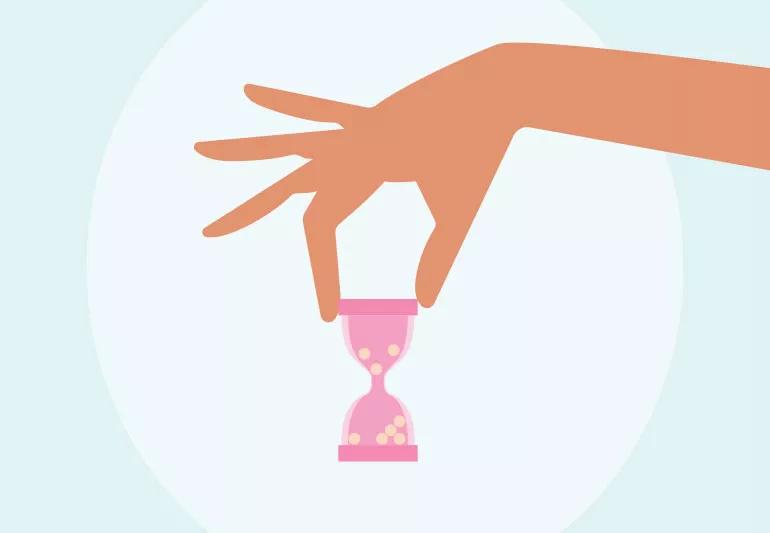The main sign that your hormones are in flux is changes in your menstrual cycles

Officially, menopause occurs when you haven’t had a period for 12 months. Alas, it’s not quite as simple as, “Now it’s here, now it’s gone.” First comes perimenopause, a transitional stage that lets you know that menopause is on its way … at some point or another.
Advertisement
Cleveland Clinic is a non-profit academic medical center. Advertising on our site helps support our mission. We do not endorse non-Cleveland Clinic products or services. Policy
So how can you tell when you’re in perimenopause, and is there any way to know when menopause is coming? Here’s what to know and how to deal.
Perimenopause typically starts in your 40s. During this phase, the ovaries gradually pump out less estrogen and progesterone — or, put simply, your reproductive system starts to run out of gas. This period of time is the lead-up to menopause.
“Menopause is defined as one year without periods in the absence of any other medical condition that impacts your period,” says women’s health specialist Pelin Batur, MD. “That typically happens in your early 50s, and then you live the rest of your life in menopause, where you no longer ovulate and you’ve lost the ability to have children.”
Early menopause happens before age 45. When menopause comes this early, you no longer ovulate or menstruate, and you can no longer become pregnant.
Another possibility is primary ovarian insufficiency (POI), a condition where your periods stop suddenly in your 30s, or sometimes even in your 20s.
“Losing estrogen before age 40 is associated with an increased risk of heart disease, lung disease, neurological conditions and osteoporosis,” Dr. Batur warns. “So if you’re younger than 40 and it seems like you’re perimenopausal — like if you haven’t bled for many months — it’s really important to talk to your doctor.”
Advertisement
There’s also the possibility that menopause could come late. If you’re 55 or older and still haven’t started menopause, that’s known as late-onset menopause.
Usually, the opening band doesn’t play for nearly as long as the headliner, and the previews are never the same length as the movie. But when the main event is menopause, the opening act sometimes takes a while.
“Perimenopause can actually start as much as a decade before menopause,” Dr. Batur says. But this isn’t the case for most people.
On average, perimenopause is thought to last about four years. Unfortunately, there’s no real way to tell in advance what your experience will be, including how long it will last or what your symptoms will be like.
For some people, perimenopause feels like no big deal, while others have a more extreme and unpleasant experience — like hot flashes that have you sweating through a tank top in February.
Dr. Batur walks you through what might happen in menopause. Bear in mind that they’re less like stages and more like symptoms; you may experience all of them or none, or some worse than others.
One of the biggest signs that your hormones are in flux is changes in your menstrual cycles, plus new or worsening symptoms like tender breasts and bad PMS. Find yourself crying one minute and irritable the next? You’re not imagining it.
But what are “irregular periods,” exactly? They could mean a number of things, like:
When to see a doctor: Don’t hesitate to talk to your healthcare provider about what’s happening, especially if things seem concerning.
“If you’re skipping months and months at a time, and then your next period is really heavy, like your body’s trying to compensate, be sure you get a checkup,” Dr. Batur says. “The same is true if you’re having a lot of spotting in between cycles, or if there’s lots more cramping or blood clots.”
One of the most infamous symptoms of menopause is hot flashes, where you suddenly feel warm or flushed for no reason. They’re thought to be caused by shifts in estrogen production, though some people are more sensitive to them than others.
“Stress can make hot flashes worse, as can lifestyle factors like consuming a lot of caffeine and alcohol,” Dr. Batur says. You can change your routines to manage hot flashes and night sweats, like by:
Advertisement
When to see a doctor: You don’t have to grin and bear it through terrible bouts of hot flashes, especially if you feel like they’re getting in the way of everyday life.
Your doctor can educate you about lifestyle changes like tweaking your diet and managing stress, as well as the possibility of hormone therapy to help ease your symptoms.
During perimenopause, you might start to experience vaginal dryness that makes sex uncomfortable or even painful. And if you’re a breast cancer survivor, you have a higher likelihood of experiencing severe vaginal dryness.
Lubricants can help. You use them just before sex to increase, well, vaginal lubrication, which reduces painful friction and chafing.
When to see a doctor: If natural or store-bought lubricants don’t help, it’s time to ask for extra help. Your doctor can prescribe vaginal hormones in the form of creams, vaginal rings or suppositories.
“These treatments deliver the hormone right where you need it,” Dr. Batur says. “And they’re oftentimes more effective at treating vaginal dryness than even systemic hormones that you would put on your skin or take by mouth.”
And try not to feel nervous asking your doctor about such a personal problem; they’re used to it, and they can help!
Advertisement
“People with vaginal dryness are oftentimes suffering, and they think they’re alone,” Dr. Batur says. “There’s lots that can be done — but first of all, we need to talk about it.”
Used to have a lion’s mane? Age and hormonal changes may adjust things a little. As we get older, most of us experience some hair thinning, and for some people, estrogen loss in perimenopause and beyond can accelerate the process. The hair on your arms, legs and pubic may become sparser, too.
Meanwhile, you might start to see some unwanted hairs in new places, like on your chin. “As your estrogen drops, some of your testosterone has a more powerful effect, relatively, which is thought to be related to that sort of hair growth,” Dr. Batur explains.
If you’re concerned about hair loss, over-the-counter products are a good first stop. And while there’s not much to be done about the occasional chin hair, a good pair of tweezers goes a long way.
When to see a doctor: “It doesn’t need to be offset if it’s not bothersome,” Dr. Batur says. But if hair loss has you self-conscious and OTC products aren’t doing the trick, your doctor can tell you about options (which can be hormonal or non-hormonal).
Like hair thinning, weight gain is another change that typically comes with age. “As with chin hair, some of the weight gain around our waistlines is thought to be related to the shift in estrogen, which gives your testosterone a relatively stronger role,” Dr. Batur explains.
Advertisement
Adopting healthy lifestyle habits can help (and if you’re not yet in menopause, start now!).
When to see a doctor: It can be especially difficult to combat weight gain in menopause, given the role that hormones play. If you can’t seem to make forward motion, ask your doctor whether you could be dealing with a compounding issue, like a thyroid problem or medication side effects.
Other possible signs of perimenopause include:
But many signs of perimenopause mimic those of other conditions, so you might not always relate them to your changing hormones or this natural stage of your life.
“In midlife, plenty of other factors can affect your physical and mental health and may mimic the signs of this time of life,” Dr. Batur says. For example:
This is sort of an annoying answer, we know, but unfortunately, when you’re going through perimenopause, there’s just no way to know which period will be your last.
Based on your age and symptoms, though, you can usually infer when you’re getting close to menopause.
“If you’re in your early 50s, you’re having hot flashes and you’ve been skipping periods for the last few years, it’s likely that you’re headed into menopause,” Dr. Batur explains.
If you’re younger than average menopausal age, your doctor will want to do some investigating to see what’s up and determine a course of treatment.
“If it’s looking like you’re menopausal before age 40, we’re almost always going to do hormone testing,” Dr. Batur confirms. “Early loss of estrogen is associated with a number of health concerns, so it’s critical that we identify early menopause.”
And no matter your age, if your symptoms are really unpleasant or disruptive, your doctor may want to run some tests and delve into your medical history to be sure you’re getting the right answers — especially because, as we’ve discussed, perimenopause and menopause aren’t always to blame.
“It’s important to make sure we’re not missing other hormonal problems outside of estrogen deficiency,” Dr. Batur says.
Menopause is a natural phase of life, so if you’re of standard menopausal age and your symptoms are mild, you don’t necessarily need to see a doctor.
But if your perimenopause or menopause symptoms are impacting your quality of life, it’s time to get some help from your primary care physician, Ob/Gyn or a doctor who is certified in menopausal medicine by the North American Menopause Society.
“You don’t need to live with uncomfortable symptoms, whatever their cause,” Dr. Batur says. Make an appointment with a healthcare provider to figure out what’s going on and how best to manage it.
To learn more on this topic from Dr. Batur, listen to the Health Essentials Podcast episode “What to Expect in Menopause.” New episodes of the Health Essentials Podcast publish every Wednesday.

Sign up for our Health Essentials emails for expert guidance on nutrition, fitness, sleep, skin care and more.
Learn more about our editorial process.
Advertisement

Estrogen loss contributes to bone loss, which significantly raises your risk of osteopenia and osteoporosis

Making certain changes to your diet, sleep habits and even your wardrobe may help lessen the impact of menopause symptoms

A women’s health specialist explains those cold flashes that come on quickly

Changing hormone levels can bring issues like brittle nails, indigestion, dry skin and new allergies (to name a few!)

The choices you make at mealtime could reduce hot flashes or make them worse

If you’ve noticed changes in your mood and mental health while going through menopause, you’re not alone

Missed periods, heavy periods, painful sex and frequent hot flashes are just a few symptoms worth discussing with your provider

At-home tests measure FSH levels in urine, but they can’t actually diagnose menopause

Even small moments of time outdoors can help reduce stress, boost mood and restore a sense of calm

A correct prescription helps your eyes see clearly — but as natural changes occur, you may need stronger or different eyeglasses

Both are medical emergencies, but they are very distinct events with different causes